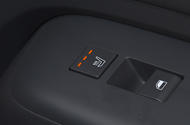Hyundai owners could soon find features such as heated seats behind a paywall
Korean company will also go a step beyond others in using the tech to improve features in older models
Hyundai is considering introducing pay-to-use features in its cars, such as the ability to activate heated seats, as part of a move to keep connected to its customers post-sale.
“We are looking at feature-on-demand as an option, in order to add more personalisation in the car,” said Marcus Welz, head of Hyundai Connected Mobility.
Announced today, this new Europe-based division will bring the Korean company’s car subscription (Mocean) and connected services (Bluelink) ventures together under one roof.
“For years we worried about how we were going to sell more cars,” said Welz. “Today we worry about ‘what if all we do is sell cars?’.”
The new division is about “the future of mobility, from today owning cars to transferring to subscriptions”, added Andreas-Christoph Hofmann, Hyundai’s vice-president for marketing, product and PR.
A key to the new division’s plans is a restructuring of Bluelink. Like others, this app currently allows owners to remotely control features such as pre-conditioning, locking and sat-nav.
Now, this system – available on newer models fitted with the 10.25in infotainment screen – will be offered in three grades: Lite (free for the first 10 years; in-car use of maps, online services etc only), Plus (€2.99 a month; access to all remote services) and Pro (€9.99 a month; advanced data-driven services such as in-car payments, including partner offers, to “connect drivers with surroundings”).
This is part of a push from Hyundai to get closer to customers post-sale. As part of that, feature-on-demand integration is one of the next steps – although the firm didn’t confirm whether this would affect cars already on the road.
This concept is nothing new. BMW, for example, already limits some features, both hardware (heated seats) and software (high-beam assistance), already fitted to the car behind paywalls. It has been widely criticised for this, however.
When asked if Hyundai’s goal was the same, Welz said it would look to go beyond today’s examples and also “bring new features into older cars”.
“What you have often seen in the industry is an old use case, for example heated seats,” he said. “This was brought to the customer using new technology such as software updates.
“However, I think the benefit of feature-on-demand is exactly the opposite: to bring new features into older cars.”
Without explaining exactly which features could be implemented remotely into older cars, Welz suggested it could instead involve upgrading software around existing components, such as the battery, motors, parking cameras and sensors to eek out more performance – at a cost.
“A lot of advancements can actually be done through the software, so you can utilise the existing hardware. We will keep developing these features and functionality and then we will provide them to users.”







